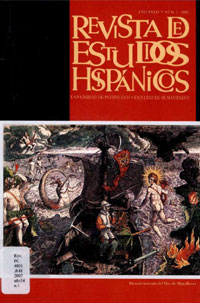Abstract
In El hablador ethnical and cultural dichotomy on various levels is presented: between Indian, Mestizo, and Westerners; between the real author‘s voice and the fictional characters‘ voices; between authorial ideology and textual ideology; between the worldview of Indians (subaltern subjects) and Westerners (hegemonic subjects); between Indians‘ acceptance or resistance to adopt Westerners‘ way of life; and between the novel and ethnography as narrative forms. In order to analyze such a variety of meanings, I propose a twofold and parallel reading: 1) as a fictional story elaborated by an author-narrator who represents himself in the process of writing a novel and 2) as an ethnographic report composed, in novel form, by an ethnologist-narrator who employs basic methods and techniques from ethnography to elaborate a fictional account about a teller of myths and traditions from the Machiguenga Indians of the Amazon.This work is licensed under a Creative Commons Attribution-NonCommercial 4.0 International License.
Downloads
Download data is not yet available.

